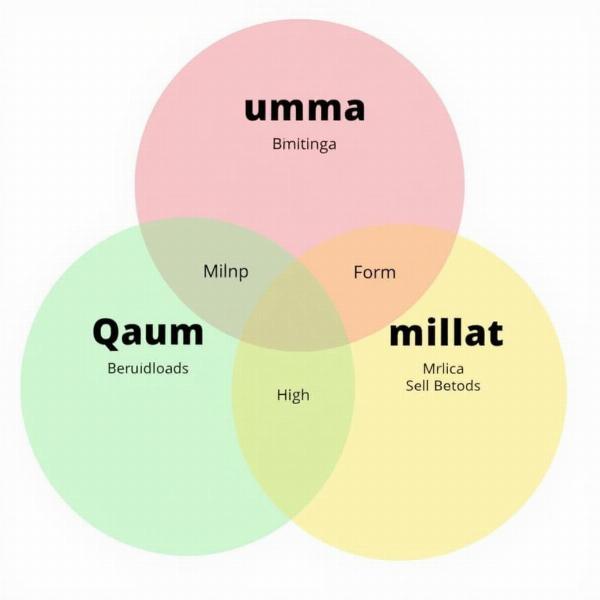Understanding the meaning and significance of “umma” in the Hindi-speaking context is crucial for anyone seeking a deeper understanding of Islamic culture and its interactions with the Indian subcontinent. While “umma” doesn’t have a direct Hindi translation, its meaning resonates deeply within the Muslim community in India. It generally refers to the global Muslim community, transcending geographical and cultural boundaries, unified by their shared faith in Islam. This concept of unity and brotherhood is a cornerstone of Islamic teachings and has significant implications for social, political, and religious life.
Understanding the Concept of Umma
The word “umma” originates from Arabic and is often translated as “nation” or “community”. However, it carries a much deeper meaning than a simply political or geographical entity. It signifies a spiritual and social bond that unites Muslims worldwide, regardless of their ethnicity, language, or nationality. This universal community is based on shared beliefs, values, and practices derived from the Quran and the teachings of Prophet Muhammad. In the Indian context, the concept of umma coexists with various other identities, including national, regional, and linguistic affiliations, creating a complex interplay of belonging and shared heritage.
Umma in the Indian Context
India, with its rich cultural diversity and a significant Muslim population, presents a unique case study of the umma’s manifestation. While integrated into the broader Indian society, the Muslim community maintains its distinct identity rooted in the concept of umma. This dual identity sometimes leads to intricate social dynamics, as individuals navigate between their religious affiliation with the global Muslim community and their national identity as Indians.
The Significance of Umma in Daily Life
The concept of umma influences various aspects of Muslim life in India, from personal practices to social interactions. It fosters a sense of solidarity and mutual support within the community, providing a framework for social welfare, education, and religious observance. For example, during festivals like Eid, the spirit of umma is palpable, as Muslims come together to celebrate and share their joy with each other and the wider community.
Umma and its Challenges in the Modern World
In today’s globalized world, the concept of umma faces several challenges, including the rise of nationalism, sectarianism, and political conflicts. These forces can create divisions within the Muslim community, undermining the ideal of unity and brotherhood. Understanding these challenges is crucial for promoting interfaith dialogue and fostering peaceful coexistence.
How “Umma” Differs from Similar Terms
While “umma” is sometimes used interchangeably with terms like “qaum” (nation) or “millat” (community), there are subtle but important distinctions. “Umma” specifically refers to the global Muslim community based on faith, whereas “qaum” can denote any group based on ethnicity or shared origin. “Millat,” on the other hand, often refers to a religious community in a broader sense. Understanding these nuances is essential for accurate and culturally sensitive communication.
 Umma vs. Other Terms
Umma vs. Other Terms
Conclusion
The concept of “umma” holds profound significance for Muslims in India and worldwide. It represents a powerful ideal of unity, brotherhood, and shared faith, shaping individual identities and community dynamics. While facing various challenges in the modern world, the umma continues to be a source of strength and inspiration for millions of Muslims, fostering a sense of belonging and shared purpose. Understanding its meaning and implications is crucial for fostering intercultural understanding and promoting peaceful coexistence in a diverse world.
FAQs
- What is the literal meaning of “umma” in Hindi? While there isn’t a direct Hindi equivalent, it’s often understood as “community” or “nation” in a religious context.
- How does the concept of umma influence Indian Muslims? It fosters a sense of belonging to a global Muslim community while also navigating their Indian identity.
- What are the challenges facing the umma today? Nationalism, sectarianism, and political conflicts pose significant challenges to the unity of the umma.
- How does “umma” differ from “qaum”? “Umma” refers specifically to the global Muslim community based on faith, while “qaum” can denote any group based on ethnicity or shared origin.
- Why is it important to understand the concept of umma? It promotes intercultural understanding and fosters respect for the diversity within the Muslim community.
- How does umma relate to the idea of brotherhood in Islam? Umma emphasizes the importance of unity and brotherhood among all Muslims, regardless of their background.
- Is the concept of umma still relevant in the 21st century? Yes, despite challenges, the umma continues to be a source of strength and identity for Muslims globally.
Meaning-Hindi.in is your trusted partner for professional Hindi translation services. We specialize in various domains, including business, legal, technical, website localization, educational, and specialized translations. Whether you need document translation, certified translation, or website localization, our expert team delivers accurate and culturally sensitive translations tailored to your specific needs. Contact us today for a free quote! Email: [email protected], Phone: +91 11-4502-7584. Meaning-Hindi.in is dedicated to bridging language barriers and connecting cultures through expert translation services.